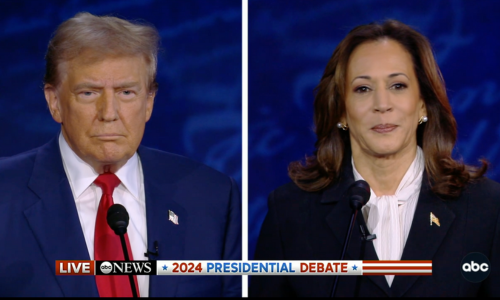Trump or Harris? Big Crypto Places Its Bets
The political alignment of crypto firms and their leaders is a subject of growing discussion in the US. This time, sympathies seem to lean toward the Republicans, while traditional financial institutions like banks are exercising more restraint than in the past.
Crypto advocates had urged ABC moderators David Muir and Linsey Davis to address crypto at last night's debate. Though the topic was not raised, it remains an important factor in American economic reporting—at least for those directly affected. Is the crypto scene betting its chips on the Democratic candidate Kamala Harris, or on Republican Donald Trump?
«Everyone’s mad,» headlines «Politico» in its recent article, «Inside the Crypto Civil War for the 2024 Election.» Meanwhile, the «Wall Street Journal» notes that Trump’s plans for the crypto industry could pose «potential conflicts» for the Republican candidate (article behind paywall).
«Ardent Embrace» of an Industry
Last week, Bloomberg reported that Trump’s circle is making further efforts to secure an «ardent embrace» of the industry (article behind paywall). And months ago, the «New York Times» revealed «how crypto money is poised to influence the election.»
Media reports consistently suggest that the Republican candidate has successfully courted the industry, while the Democratic candidate remains on the sidelines. Her campaign platform, unveiled just days ago, omits the issue entirely.
Trump: From Skeptic to Flagbearer
Trump has undergone a remarkable transformation. In 2019, he tweeted that cryptocurrencies were «based on thin air.» Today, he wants to make the US the «crypto capital of the planet.»
On his own social media platform, «Truth Social», the Republican wrote: «For too long, the average American has been squeezed by the big banks and financial elites. It’s time to stand together.»
Global Rollout of Dollar-Based Stablecoins
Together with his family, Donald Trump is promoting «World Liberty Financial», an organization aimed at establishing stablecoins based on the dollar worldwide, in a bid to maintain and expand the dollar’s dominance.
That the industry is aligning more with Trump than with Harris is no coincidence. While the US Securities and Exchange Commission (SEC), under the current administration, has paved the way for crypto ETFs, it has also launched numerous legal actions against crypto firms – particularly trading platforms like Ripple – that it believes are operating without proper authorization.
Biden Administration: «Aggressive Crackdown»
The «New York Times» describes this as an «aggressive crackdown.»
Gary Gensler, the SEC Chair appointed by President Joseph Biden, is, according to «Politico», one of the industry’s «biggest foes,» alongside Democratic Senator Elizabeth Warren from Massachusetts.
Millions for Trump
In the presidential race, several prominent crypto figures have thrown their support behind Trump. Marc Andreessen, co-founder of the venture capital firm Andreessen Horowitz, which is heavily invested in crypto assets, recently stated that the Republican is «the right choice» for «the future of our business.»
Cameron and Tyler Winklevoss, co-founders of the digital asset company Gemini, have each pledged $1 million in donations to Trump.
Some Back Harris
Meanwhile, Howard Lutnick, CEO of Cantor Fitzgerald, which manages investments for Tether Holdings, the issuer of the well-known USDT stablecoin, is even part of Trump’s transition team.
However, the enthusiasm for Trump is not unanimous within the crypto community. Billionaire and crypto investor Marc Cuban encouraged Joe Biden’s then-active campaign a few months ago to open up to the concerns of the drifting crypto scene. And Ripple’s co-founder and president, Chris Larsen, has announced his support for Kamala Harris, as «Coindesk» recently reported.
More Important than the Presidential Election
Ripple CEO Brad Garlinghouse, meanwhile, has been actively supporting the Republicans. «The 2024 elections will be the most consequential in crypto’s history,» he is quoted as saying. «You are seeing a technology become a partisan political issue.»
However, for the crypto industry, the battle for Congress, where legislation is crafted, is more important than the race for the White House.
A War Chest of Over $150 Million
Through Political Action Committees (PACs), crypto firms such as Coinbase, Ripple, and Andreessen Horowitz have raised over $150 million to influence state and federal elections for the Senate and the House of Representatives.
In these industry lobby groups, there is less evidence of partisan bias. They support candidates from both parties, seeking favorable legislation and regulation.
For Banks, It's Tricky This Time
The outlook is less dynamic for traditional banks than for the crypto scene. Many of the largest financial institutions supported the Democrats in past elections. During the 2020 presidential election, Wall Street-backed the Biden-Harris ticket with $74 million, while Trump received just under a third of that.
This time, however, things are more complicated. Due to «Pay to Play» legislation, financial institutions that seek to influence politics at the local and state level through campaign donations risk being barred by the SEC from providing certain services to municipalities and states, such as managing public pension fund assets.
Since Kamala Harris has chosen sitting Governor Tim Walz as her vice-presidential running mate, this rule applies. Several banks have instructed their employees not to make campaign donations to the Harris/Walz campaign without employer approval, as «Business Insider» first reported (article behind paywall).



























